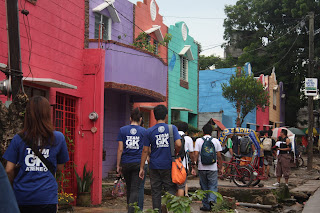One of the many advantages of the third year, this year the dream becomes reality et où l'on découvre le vrai monde, est la possibilité d'avoir du temps libre.
Du temps libre, ne veux pas dire quelques heures ou un samedi après midi pour se reposer, ne rien faire ou aller au ciné, c'est des jours où l'on n'a vraiment rien à faire, et que l'on peut occuper à quelque chose d'utile pour les autres !
Ainsi, l'engagement dans une/des association(s) me paraissait une part importante de ma troisième année.
N'ayant que deux jours de cours par semaine, et souhaitant en garder quelques uns pour voyager, il me reste tout de même un certain nombre d'heures de libre.
Une chose intéressante à noter est que l'engagement associatif à l'université est la règle ici, quand elle n'est qu'une exception à Sciences Po (et encore pire, je crois pouvoir dire, à Jussieu). Cela implique que quasiment tous les étudiants font partie d'au moins une association, et que la majorité font partie de bien plus.
La première association à laquelle j'ai adhéré s'appelle Musmos, il s'agit d'une organisation d'Ateneo qui va, tous les samedis, faire de l'animation pour des enfants qui appartiennent à la low class.
Je n'y vais pas très souvent parce que mes samedis matins sont très occupés par les voyages, mais à chaque fois que je vais à ma matinée Musmos, je reviens le sourire aux lèvres !
These PTIS bou of cabbage, with completely decayed teeth (it really hurts the heart when you see it ...), legs hot by mosquitoes , are smiling all the time.
Due to my very recent experience in animation, I can only say that they are perfect children!
Why?
On more than one hundred kids of all ages, in a space no bigger than a basketball school yard, they are wise, and so happy to play they can, without get tired, spend 30min to Fish Net, when children stop outdoor center after 10min ...
The other part of the program is education, ie they are told a story at each meeting, and after little quiz (and drawings for the youngest), and the kids are still once too too impressive, very concentrated.
short, I love going to that assoc '.
To continue with the university, I also attended a weekend in the construction of houses, which actually carry summarized bags of rubble and land in a neighborhood where houses are built by an association called GK.
was pretty funny, the area is very colorful, and paint a yellow house farting, I think it's quite an experience to remember!
lunchtime, we were treated to a meal I eat in fashion with fingers on banana leaves and I admit it was very funny, especially when lack of experience and put it in everywhere. .. but cats who have passed appreciated.
Chiori, one of my friends in Japan, trying to show his perfect technique!
houses flashy
Finally I am also engaged as a trainee in a local NGO (outside the university), called Mother Earth Foundation. Indeed, after quite a tour, sent a good twenty emails and CVs / cover letters right to left, met with the director of an NGO who works with street children, I finally decided to get involved more effectively in protecting the environment.
Indeed, it is a small organization, though a fairly large influence in the Philippines. It is part of the international coalition Zero Waste, which as its name suggests has a mission to minimize waste generation.
To this end, the main program of Mother Earth Foundation is to promote waste separation and recycling methods / compost, all in full cooperation with the people and authorities Local.
Thus, the program starts in each district by a survey of existing practices and implementing training programs to educate people about the different practices and at the end of a program evaluation to determine its effectiveness.
And the least we can say is that it works well. Indeed, the latest program I tried was successful in 3 months (a short-term) to put in place in at least one quarter of households compost, and in at least half a segregation Effective waste, with a total cessation of fire (Burning of household and agricultural waste).
A second part of their work lies in the education of teachers and students (but the main target is teachers, more effective long term), the protection of the environment.
For this, we use two U.S. programs called Project WET (Water Education for Teacher) http://www.projectwet.org/ and PLT (Project Learning Tree, more focus on biodiversity) http://www. plt.org / , which have proven in the USA.
They serve as bases for courses / activities for all levels from kindergarten to university, in all subjects, enabling visitors to combine references to environmental awareness and protection, by promoting the existing resources in the Philippines and worldwide.
This work (as does the fact of being in contact with the Filipinos in that organization), I get a lot personally, and it's very interesting to see how a country which, from the point European view seems almost completely undeveloped, manages to develop as effective and innovative projects (in college, where part of the program is applied when you buy a coffee, there is a 'Deposit' of 10 pesos for the return of the cup, and 20 pesos for tupperware when you buy food, there are 4 different bins for compostable, recyclable paper, and more!)
Here for now but I hope to also soon to volunteer in a small association which looks after street children called Urchins, children sidewalks.









0 comments:
Post a Comment